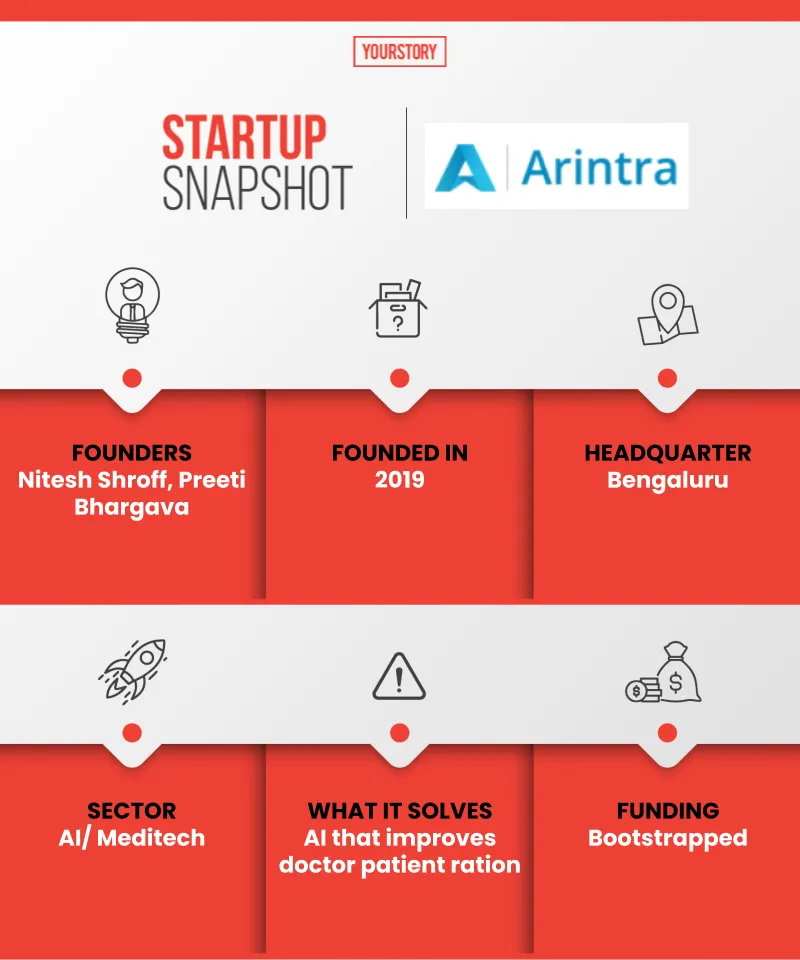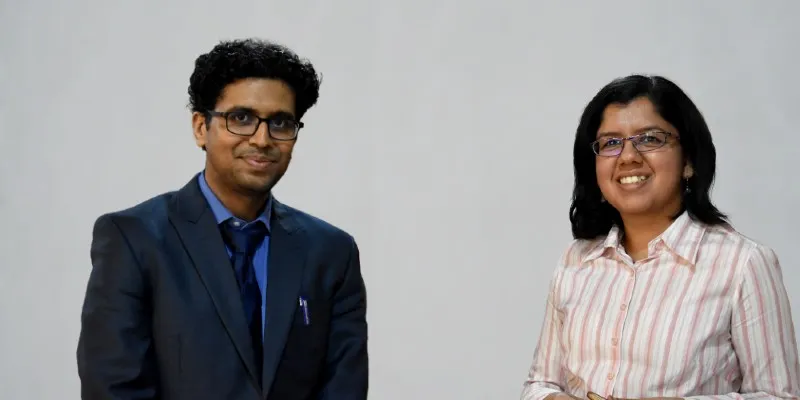[Tech30] Healthtech startup Arintra aims to free up doctors’ time and improve patient outcomes
Bengaluru-based AI-powered healthtech platform Arintra has found place on YourStory’s Tech30 list for its software that assists doctors with clinical data capture, visualisation, and insights for efficient consultations and improved patient outcomes.
It’s well documented that the doctor-patient ratio is in India falls below the WHO recommendation of 1:1000. The Economic Survey 2019-20 reveals that the country has one doctor per 1,456 patients, a gap that seems massive in the time of the COVID-19 pandemic.
Startups and innovators have jumped into the fray to solve this scarcity problem with technology.
Meet Bengaluru-based , an AI-powered software platform that assists doctors with clinical data capture, visualisation, and insights for efficient consultations and improved patient outcomes.
Essentially, the clinical AI platform for patient assessment aims to reduce the “overload” on medical practitioners and healthcare “by almost 30 percent”.
“It is akin to a resident doctor conducting a medical interview,” says Nitesh Shroff, Co-Founder and CEO of Arintra, of his startup that has made it to YourStory’s Tech30 list for 2020.
Designed for India-specific problems
Started in November 2019 by Preeti Bhargava and Nitesh, Arintra enables clinical associates or patients themselves to capture comprehensive patient history prior to consultation.
“This effectively shifts some of the doctor’s load on to assistants or patients. Our medical AI intelligently deep-dives into patients’ history, based on their chief complaints and previous responses,” Nitesh says.
The software is easy to use – the physician’s assistant or patient can use Arintra outside a doctor’s chamber or remotely during the patient wait time to capture comprehensive and precise clinical history. It uses medical AI to intelligently generate probing questions based on chief complaints and previous answers.
This profile includes History of Present Illness (HPI), review of systems, medication history, social history, pre-existing conditions etc.
Elucidating further, he says Arintra uses clinical information extraction on a patient’s clinical data to generate a smart patient visualisation, which is easy for the doctors to absorb and “reduces the cognitive burden of navigating patient records”.
The healthtech startup uses deep learning models to generate clinical insights such as provisional diagnosis, lab recommendations, etc. to help reduce medical errors.
The Arintra platform is available in languages such as English, Hindi, Tamil, Kannada, Telugu, and Gujarati.
Preeti says Arintra’s technology stands out amidst its competition such as , Wondrx, , and , as its AI models are “trained to address India-specific diseases” and are “low-cost, mobile-first solutions that need no extra equipment”.

Preeti, a graduate of Delhi College of Engineering, did her PhD in computer science from University of Maryland. Nitesh, a BTech in electrical engineering from IIT-Madras , holds a PhD in electrical engineering from University of Maryland. Both met during their PhD, spoke about this “overload on doctors” and decided to bridge the gap.
Revenue model and funding
Arintra is still in beta mode and yet to generate any revenue. A handful of doctors and hospitals are using the product on a trial basis.
Preeti says the startup is in the process of filing a patent for its technology, which will also add to its revenue stream later as the company will license its APIs to remote clinics and telemedicine companies on a pay-per-use basis.

The founders of Arintra
Arintra has a Software as a Service (SaaS) business model where it sells its products as subscriptions to hospitals on a per doctor, per month basis .“Our sales channels include direct sales, channel partners, B2B, and government partnerships,” Nitesh says.
The bootstrapped company has won various grants and award money in startup competitions.
Nitesh says Arintra wants to expand across India to and other countries, and is “looking to raise a seed round of at least $500,000 in the next six months to support these plans”.
Edited by Teja Lele


![[Tech30] Healthtech startup Arintra aims to free up doctors’ time and improve patient outcomes](https://images.yourstory.com/cs/2/70651a302d6d11e9aa979329348d4c3e/Preeti-1603800558000.jpg?mode=crop&crop=faces&ar=2%3A1&format=auto&w=1920&q=75)
![[Startup Bharat] Lucknow-based Dectrocel Healthcare and Research’s AI tool can screen COVID-19 for just Rs 100](https://images.yourstory.com/cs/2/70651a302d6d11e9aa979329348d4c3e/SB1-1602754435465.png?fm=png&auto=format&h=100&w=100&crop=entropy&fit=crop)




